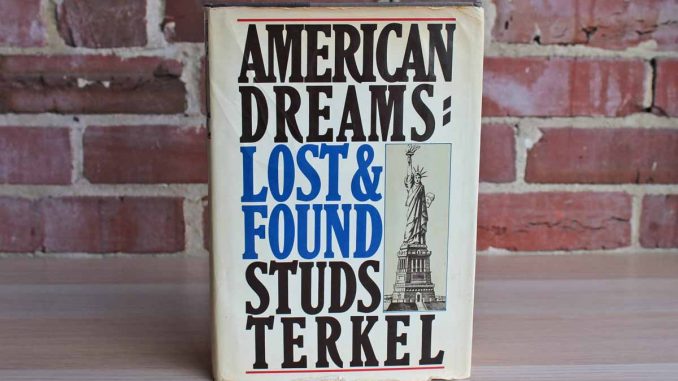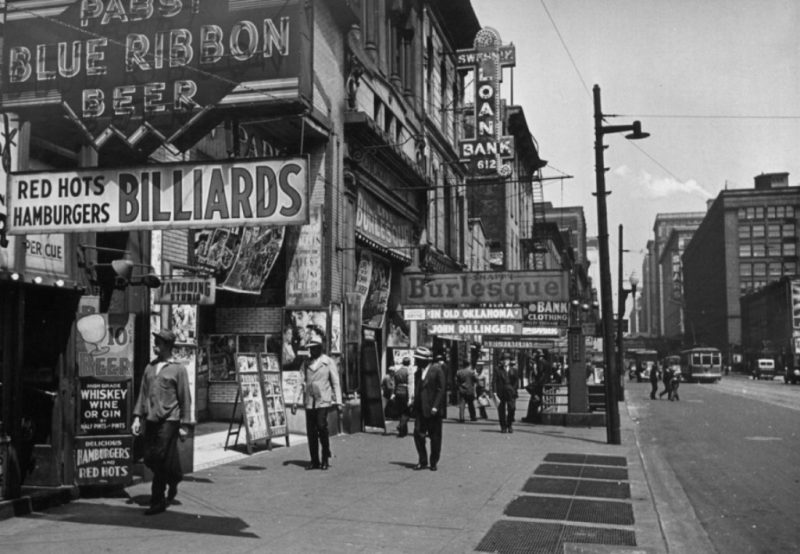
America’s premier oral historian investigates its abiding myth.
On the website of the publisher, New Press, in an uncredited paragraph, ‘American Dreams: Lost and Found’, and its author, Studs Terkel, is described as follows:
“Terkel persuades an extraordinary range of Americans to articulate their version of “The American Dream.” ………. Terkel explores the diverse landscape of the promise of the United States from farm kids dreaming of the city to city kids determined to get out, from the Boston Brahmin to the KKK member, from newly arrived immigrants to families who have lived in this country for generations, these narratives include figures both famous and infamous”.

Louis ‘Studs’ Terkel was born in Russia of Jewish stock and came to America as a child. His life encompassed the 20th century, born in 1912 and dying in 2008 and always synonymous with the city of Chicago. He would not have been unhappy to be identified with the politics of the left – and I suppose he might be seen as something of an anachronism today in dedicating his book to Nelson Algren and adopting the first name of James Farell’s infamous Lonnigan (all that said, read Leonel Castillo’s interview on p33 to gauge how much things do and don’t change).
Being left-handed I am well aware of the popular and historic view of the left in any form – something to be beaten out of a child, a sign of the devil, and when attached to certain political ideas almost inherently negative and pejorative; few current American politicians would grasp words like socialist with any enthusiasm. Terkel however seems to have lived and breathed it, working in his early years as a writer for the WPA Federal Writers Project – one of Roosevelt’s New Deal programmes. This was the start of a long association with radio and broadcasting. Terkel went on to be ostracised (or ‘blacklisted’ as they would have it) during the McCarthy years (nowadays seen as something of a medal of honour but usually terminal in its time). You may of course also have noticed the political colour of this website which, in my experience reflects the beliefs of the vast majority of artists that contribute or are featured.
As one reader puts it on the always interesting, ‘Goodreads’, website,
‘Before the advent of blogs, chat rooms, and other gabby Internet venues, there was Studs Terkel. The ole newshound was famous for his books of oral histories about common Americans’.
The purpose of this series is primarily to highlight certain books, not necessarily those who wrote them, which leaves two issues to address. Firstly this book is not exactly an example of Terkel’s penmanship, recording as it does the voices of others with minimal intervention by the author. Notably, he avoids the use of literal transcription that can dull the senses with a series of ‘oohs, ahs’ and ‘uhs’ all of which make the participants sound incoherent and scarcely cogent. Secondly, Terkel has had such a long and interesting life that it is very hard to ignore it when writing about his publications – his life almost serves as a soundtrack to the century he lived in.

There are many of his books that might be worthy of review but the one that has been on my shelves for many years is, ‘American Dreams: Lost and Found’, (Paperback Paladin edition published in 1982). I might just as easily have chosen his volumes on work, The Depression, social division, movies and plays, the Second World War, race, the story of the century, or Chicago itself. None of which would encompass his works on Jazz, his own memoirs, death and faith, or being a DJ. I looked for something that might have called itself a full bibliography but was unable to find one and none of the above encompasses his radio programme (which ran from 1952 to 1997), his early work as an actor, or his many awards and honours culminating in a Pulitzer Prize. I think the operative phrase is ‘a life well lived’.
The American Dream – apparently an aspiration for all – is a reality for some and never more than a dream for most. You couldn’t devise a better way to keep the vast majority of people in their place to the benefit of the few given that it relies on the many being the pyramid base that allows the few to inhabit the apex. The American Dream is one of those ideas we all understand – or so we think – but here are two definitions, chosen at random from the Internet, neither of which encompass anything about the potentially negative impact of race, socio-economic status, health, poverty, geography or educational opportunities.
‘The American dream is the belief that anyone, regardless of where they were born or what class they were born into, can attain their own version of success in a society in which upward mobility is possible for everyone’.
‘The American Dream is the freedom and ability to write your own future. Whether that’s improving your education, finding a job to support your family, or starting your own business, you ultimately have control on the path you choose’.
John Fielding was an academic who, when Terkel met him, had been denied tenure – a pivotal moment in the life of an academic American. It’s hard to say that he has neglected any of those work-related components that should have granted him access to the ‘Dream’ but he discovers that,
‘Universities are corporations first educational institutions second. Education is what they market’.
So there’s a lesson made plain in 1980 that we have ignored in this country, where standards have fallen and everyone gets a prize – however worthless. To be honest – surely the ‘Dream’ is about making enough money to make Croesus blush. It’s akin to the national lottery with the inbuilt absurdity that the more people who buy into it the less chance you have to win.
The book has a hundred interviews in it ranging from unknowns to some very well-knowns such as Ted Turner, Jann Wenner, Arnold Schwarzenegger and Joan Crawford. Funnily enough the famous tend to say ‘all good’ in terms of, ‘The Dream’, whilst the people at the bottom of the pyramid might echo Sharon Fox on p94,
‘I’m just one of millions. A hundred years from now, I’ll just be a name on a gravestone and that will be it’.
Contrast that to Wenner’s description on p460, of his schooling after he left the public system (if you can bear the reek of entitlement that permeates the interview of a man who now believes he is in the, ‘Centre of the fucking world’, in New York)
‘At twelve you are thrown into an elite kind of training’,
An unnamed journalist’s comments on the effect of moving Rolling Stone from West to East, highlight the kinds of Faustian pacts that the, ‘Dream’, requires given that, ‘The hard edge has dissipated‘. Wenner celebrates 3 million readers, the unnamed journalist questions whether victory or defeat is indicated as, ‘Jimmy Carter marched into the Democratic Convention after winning the nomination, preceded by a song written by Greg Allman’.

This is a weighty book running to nearly 550 pages and I don’t suppose that every interview is riveting – though there were apparently several hundred that weren’t used in the process – for which Terkel has the good grace to apologise. Having spent over 40 years of my life listening to other people’s stories I find them, by and large, fascinating. There are many whose experiences of being listened to are extremely limited – one reason, I believe, why our politics has become so polarised and limited in recent times. There may be one or two that don’t catch your fancy but Terkel is acknowledged as the master of this kind of work even if ultimately he relies on his interviewees to tell an interesting story. Yes, it is a big book, but it is entirely possible to profitably dip in and out. Everyone should, at some point, take a look into at least one of Terkel’s books.
Attached below are links to a brief interview with Bob Dylan and a BBC documentary. In both, Terkel reveals himself to be more of a talker and less of a listener than might be imagined from his books. Given that he is a native of Chicago, that’s no surprise and I hope that it is permissible to say that as someone of Jewish extraction, if not conviction, he is always a likely victim of the sometimes uncontrollable love of words and language.


